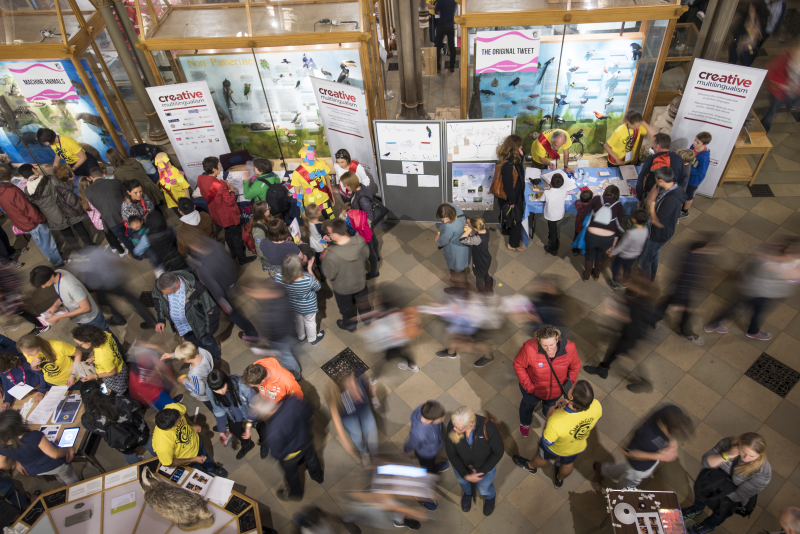Public Engagement with Research: a toolkit for Modern Languages researchers

The Creative Multilingualism team have created a toolkit for Modern Languages researchers with advice and ideas on how to run public engagement events. This toolkit will offer solutions to challenges you may come across, and will hopefully inspire you to find new, creative ways to share your Modern Languages research.

Creative Multilingualism Goes Digital

Creative Multilingualism Goes Digital takes stock at the end of the momentous year 2020. It offers insights into the transformation processes and reflections on why the Creative Multilingualism team was well-positioned to undertake them.

Slanguages in the Creative Economy - A Report

The Slanguages in the Creative Economy research project – undertaken by Beatfreeks and Slanguages – spoke to 10 artists from the West Midlands who use other languages as part of their work. The ensuing report sees the beauty and power in using different languages, slang and dialect across a range of artistic disciplines. It shows how, in spite of preconceptions, xenophobia and tokenism, multilingualism – and the multiculturalism that it engenders – can be a force for good to change our creative industries and their related economy. In the report you will read about languages from around the world, creative forms which span across genres and styles, and from people with a variety of backgrounds. What unifies them here is the impact that using languages has on their creativity.

Creativity with Languages in Schools - A Report

The Creativity with Languages in Schools report documents the impacts of Creative Multilingualism’s work in and with schools from 2016 to 2020. Most of the programme’s work took place in England and Wales, but the report also shows the international influence it has had. Evidence for five main impacts – Professional Development, Creativity, Perceptions, Networks and Connections, and Motivation – is presented from across the seven CML research strands and from the Multilingual Performance Project which ran from January 2018 to June 2020.

(Re)Creating Modern Languages – A Higher Education Curriculum Reform report
Creating%20Modern%20Languages_Conversations%20about%20the%20Curriculum%20in%20UK%20Higher%20Education/index.jpg)
The (Re)creating Modern Languages: Conversations about the Curriculum in UK Higher Education Toolkit is designed to support colleagues who are planning to review the teaching in their institution. It offers frameworks for thinking through and planning comprehensive curriculum change, drawing on the experience of colleagues who have recently undertaken these changes or are working through them at the time of writing. It also showcases examples of excellent and innovative practice at module level, providing ideas for (re)thinking how language departments can work with external partners to enhance student experience.

Ask the Teachers! GCSE curriculum and exam content survey (2020)
Modern Foreign Languages has long been subject to falling numbers at both GCSE and A level, with low motivation widely being perceived as a key factor. Researchers from the universities of Oxford and Reading have conducted a survey with over 600 teachers from some 470 schools across England to find out what they believe the curriculum and exam content should focus on.

Consulting Teachers on the DfE's Proposal for GCSE Content in Languages (2021)
In November 2019, the Department for Education (DfE) appointed an independent panel of experts to review the subject content for GCSEs in modern foreign languages (MFL), in French, German and Spanish. The panel’s proposals were published by the DfE in March 2021, and at the same time the DfE launched a public consultation on the proposed changes. The proposals included fundamental changes to the GCSE examination, which would have far-reaching consequences for teaching of languages from primary level up to GCSE and potentially beyond. In order to investigate teachers’ views on the proposed changes and their likely impact, we conducted a survey.

DfE consultation on proposed new GCSE subject content for MFL (French, German, Spanish): Response from Creative Multilingualism
The subject content defined by the Department for Education (DfE) for the GCSE in Modern Foreign Languages establishes the basis for language teaching in schools in England. It affects take-up and progression through to university, and it is consequently of fundamental importance for the long-term health of the subject. Creative Multilingualism therefore submitted a response to the DfE’s consultation on proposed new subject content for French, German and Spanish, published in March 2021.

OWRI Student Language Ambassador Programme Evaluation Report

The OWRI Student Language Ambassador Programme was designed to increase the number of students progressing in the study of a language from GCSE to A level in four regions across the UK. The evaluation report found that the programme led to a noticeable uptake in the number of pupils continuing a language at A level.